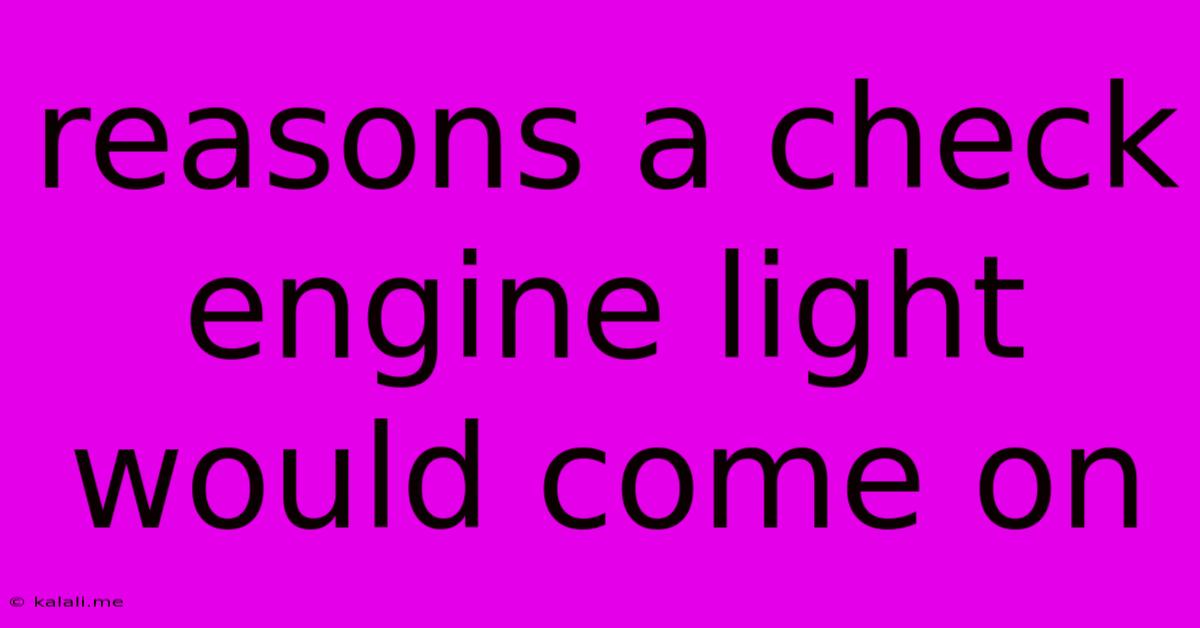Reasons A Check Engine Light Would Come On
Kalali
Jun 07, 2025 · 4 min read

Table of Contents
Reasons Your Check Engine Light Might Be On: A Comprehensive Guide
Your check engine light—that dreaded illuminated icon—can send shivers down the spine of even the most seasoned driver. It signals a problem with your vehicle's engine control system, but the cause can range from minor inconveniences to serious mechanical issues. This comprehensive guide explores the common reasons why your check engine light might be illuminating, helping you understand the potential problems and decide on the best course of action. Ignoring it could lead to further damage and costly repairs, so understanding the potential culprits is crucial.
Understanding the Check Engine Light System
The check engine light is part of your car's On-Board Diagnostics (OBD) system. This system monitors various engine components and sensors, constantly checking for malfunctions. When a problem is detected, the light illuminates, prompting you to address the issue. The OBD system is sophisticated, and the light itself doesn't always pinpoint the exact problem; it simply indicates that something needs attention.
Common Reasons for a Check Engine Light
The causes for a check engine light are varied. Here are some of the most frequent culprits:
Loose or Damaged Gas Cap
This is often the simplest and least expensive fix. A loose or damaged gas cap can allow fuel vapors to escape, triggering the light. Simply tightening the cap or replacing it might resolve the issue. Your car's computer will often perform a self-diagnostic, and the light may turn off after a few driving cycles if this was the sole cause.
Faulty Oxygen Sensor (O2 Sensor)
The oxygen sensor monitors the amount of oxygen in the exhaust gases. A malfunctioning sensor can impact fuel efficiency and emissions. Symptoms beyond the check engine light might include reduced fuel economy, rough idling, or black smoke from the exhaust. Replacement is usually necessary if this is the problem.
Mass Airflow Sensor (MAF) Problems
The mass airflow sensor measures the amount of air entering the engine. A dirty or faulty MAF sensor can lead to inaccurate fuel mixture calculations, resulting in poor performance, rough idling, and the illuminated check engine light. Cleaning the sensor (carefully!) is sometimes sufficient, but replacement might be necessary.
Catalytic Converter Issues
The catalytic converter reduces harmful emissions. A failing converter can cause a loss of power, poor fuel economy, and, of course, the dreaded check engine light. This is usually a more expensive repair, requiring replacement of the converter.
Spark Plug or Ignition Coil Problems
Worn-out spark plugs or faulty ignition coils can prevent proper combustion, leading to misfires and illuminating the check engine light. These are relatively common issues and usually require replacement.
Problems with the PCV Valve (Positive Crankcase Ventilation)
The PCV valve helps to prevent the buildup of pressure in the crankcase. A malfunctioning PCV valve can lead to various engine problems, including increased oil consumption and the check engine light.
Issues with the Throttle Position Sensor (TPS)
The TPS monitors the throttle position, providing crucial information to the engine control unit (ECU). A faulty TPS can lead to poor engine performance and the check engine light.
Vacuum Leaks
Leaks in the engine's vacuum system can disrupt the proper functioning of various components, resulting in the check engine light illuminating. Finding and repairing these leaks can be challenging.
What to Do When Your Check Engine Light Comes On
- Don't panic: While concerning, it's not always a catastrophic event.
- Check your gas cap: This is the easiest and cheapest fix.
- Get your car scanned: A diagnostic scan will provide a specific trouble code (DTC), pinpointing the potential problem. This is crucial for accurate diagnosis and repair.
- Address the issue promptly: Ignoring the light can lead to further damage and more expensive repairs.
- Consult a mechanic: If you're unsure about the cause, a qualified mechanic can diagnose and repair the problem.
This guide provides a general overview of potential causes. The specific reason for your check engine light will depend on your vehicle's make, model, and year. Always consult a qualified mechanic for a proper diagnosis and repair. Remember, proactive maintenance can help prevent many of these issues from arising in the first place.
Latest Posts
Latest Posts
-
What Happens When An Attack Crits 5e
Jun 07, 2025
-
Difference Between Differential Equation And System Of Equations
Jun 07, 2025
-
How Many Puzzle Pieces For 5 Year Old
Jun 07, 2025
-
Car Ac Stinks When First Turned On
Jun 07, 2025
-
High End Gold Plated Audio Knobs
Jun 07, 2025
Related Post
Thank you for visiting our website which covers about Reasons A Check Engine Light Would Come On . We hope the information provided has been useful to you. Feel free to contact us if you have any questions or need further assistance. See you next time and don't miss to bookmark.